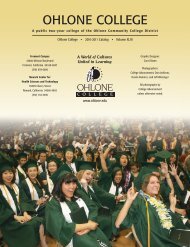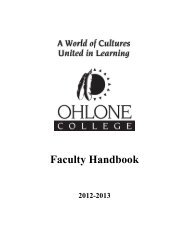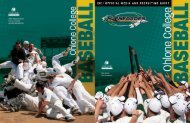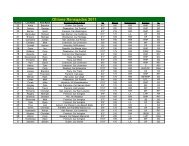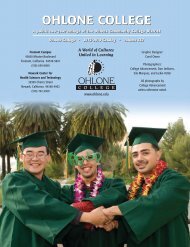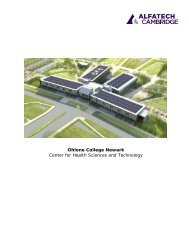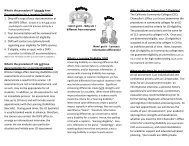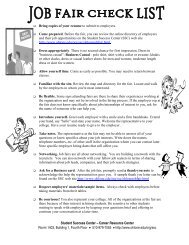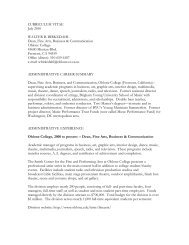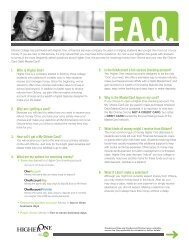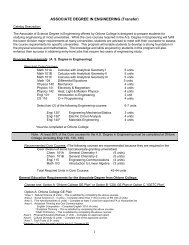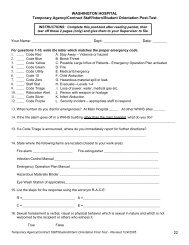Degree, Certificate, and Transfer Information - Ohlone College
Degree, Certificate, and Transfer Information - Ohlone College
Degree, Certificate, and Transfer Information - Ohlone College
Create successful ePaper yourself
Turn your PDF publications into a flip-book with our unique Google optimized e-Paper software.
48 6 DEGREE, CERTIFICATE, AND TRANSFER INFORMATION<br />
Area II Social <strong>and</strong> Behavioral Sciences/American Institutions<br />
Courses in the social <strong>and</strong> behavioral sciences are those which focus on people<br />
as members of society. To satisfy the general education requirement in social<br />
<strong>and</strong> behavioral sciences, a course shall be designed to develop an awareness of<br />
the methods of inquiry used by the social <strong>and</strong> behavioral sciences. It shall be<br />
designed to stimulate critical thinking about the ways people act <strong>and</strong> have acted<br />
in response to their societies <strong>and</strong> should promote appreciation of how societies<br />
<strong>and</strong> social subgroups operate. This category would include introductory or<br />
integrative survey courses in cultural anthropology, cultural geography,<br />
economics, history, political science, psychology, sociology, <strong>and</strong> related<br />
disciplines. (Title 5)<br />
Upon receipt of an associate degree from <strong>Ohlone</strong> <strong>College</strong>, a student will be able<br />
to:<br />
1. Distinguish the ways human cultures develop <strong>and</strong> how people behave<br />
within the context of their cultures.<br />
2. Demonstrate an underst<strong>and</strong>ing <strong>and</strong> appreciation of social, political, <strong>and</strong><br />
economic institutions within a historical perspective.<br />
3. Identify <strong>and</strong> apply the major theories <strong>and</strong> methods of inquiry of the social<br />
<strong>and</strong> behavioral sciences to specific cultures <strong>and</strong> social groups.<br />
Area III Fine Arts/Humanities<br />
A. Fine Arts – Courses which focus on the arts in a context which is historical,<br />
analytical, or theoretical. These courses address the need for the student to<br />
develop an aesthetic underst<strong>and</strong>ing <strong>and</strong> ability to make value judgments in<br />
a measurable <strong>and</strong> integrative way. (<strong>Ohlone</strong> <strong>College</strong> definition)<br />
Upon receipt of an associate degree from <strong>Ohlone</strong> <strong>College</strong>, a student will be<br />
able to:<br />
1. Appraise <strong>and</strong> evaluate the aesthetic elements of the fine <strong>and</strong> performing<br />
arts.<br />
2. Analyze the contributions of the fine <strong>and</strong> performing arts from historical,<br />
cultural, <strong>and</strong> theoretical perspectives.<br />
B. Humanities – Courses in the humanities are those which study the cultural<br />
activities <strong>and</strong> artistic expressions of human beings. To satisfy the general<br />
education requirement in the humanities, a course shall be designed to help<br />
the student develop an awareness of the ways in which people through the<br />
ages <strong>and</strong> in different cultures have responded to themselves <strong>and</strong> the world<br />
around them in artistic <strong>and</strong> cultural creation <strong>and</strong> help the student develop<br />
aesthetic underst<strong>and</strong>ing <strong>and</strong> an ability to make value judgments. Such<br />
courses could include introductory or integrative courses in the arts, foreign<br />
language, literature, philosophy, <strong>and</strong> religion. (Title 5)<br />
Upon receipt of an associate degree from <strong>Ohlone</strong> <strong>College</strong>, a student will be<br />
able to:<br />
1. Appraise the role of the arts, foreign language, literature, philosophy,<br />
<strong>and</strong> religion in cultural development.<br />
2. Assess the relationships among the arts, the humanities, <strong>and</strong> the self.<br />
Area IV Analytical Thinking <strong>and</strong> Oral Communication<br />
Courses in language that cover the principles <strong>and</strong> applications of language<br />
toward logical thought, clear <strong>and</strong> precise expression, <strong>and</strong> critical evaluation of<br />
communication in whatever symbol system the student uses. A. English<br />
Composition: Courses fulfilling the written composition requirement shall be<br />
designed to include both expository <strong>and</strong> argumentative writing. B.<br />
Communication <strong>and</strong> Analytical Thinking: Courses fulfilling the communication<br />
<strong>and</strong> analytical thinking requirement include oral communication, mathematics,<br />
logic, statistics, computer languages <strong>and</strong> programming, <strong>and</strong> related disciplines.<br />
C. Mathematics: MATH-155 or a passing score on the placement test will satisfy<br />
this requirement. (Title 5; <strong>Ohlone</strong> <strong>College</strong> adds Area C Mathematics)<br />
A. English Composition<br />
Upon receipt of an associate degree from <strong>Ohlone</strong> <strong>College</strong>, a student will be<br />
able to:<br />
1. Write a well-organized paper in St<strong>and</strong>ard English which presents a main<br />
idea supported by effective documentation <strong>and</strong> details.<br />
2. Demonstrate the ability to write effectively using correct grammar.<br />
3. Choose the appropriate style <strong>and</strong> method of communication for a<br />
variety of contexts.<br />
B. Language <strong>and</strong> Rationality<br />
Upon receipt of an associate degree from <strong>Ohlone</strong> <strong>College</strong>, a student will be<br />
able to:<br />
1. Think logically <strong>and</strong> critically to solve problems, explain conclusions, <strong>and</strong><br />
evaluate evidence or critique the thinking of self <strong>and</strong> others.<br />
2. Demonstrate the ability to make an effective decision in a variety of<br />
settings.<br />
C. Math Proficiency<br />
Upon receipt of an associate degree from <strong>Ohlone</strong> <strong>College</strong>, a student will be<br />
able to demonstrate the ability to think analytically by applying the concepts<br />
<strong>and</strong> techniques of arithmetic <strong>and</strong> beginning algebra to the solution of real<br />
world math applications.<br />
Area V. Physical Education/Wellness<br />
Physical Education courses are activity based. Wellness courses are not<br />
necessarily activity based <strong>and</strong> have a focus on such topics as nutrition, stress<br />
management, weight management, fitness, <strong>and</strong> acupressure. (<strong>Ohlone</strong> <strong>College</strong><br />
definition)<br />
A. Physical Education<br />
Upon receipt of an associate degree from <strong>Ohlone</strong> <strong>College</strong>, a student will be<br />
able to:<br />
1. Maintain a regular regimen of physical activity <strong>and</strong>/or exercise.<br />
2. Demonstrate fundamental skills incorporating the rules <strong>and</strong> strategies of<br />
the activity.<br />
B. Wellness<br />
Upon receipt of an associate degree from <strong>Ohlone</strong> <strong>College</strong>, a student will be<br />
able to formulate a personal wellness plan incorporating the basic principles<br />
of a healthful lifestyle.<br />
2011-2012 OHLONE COLLEGE CATALOG



